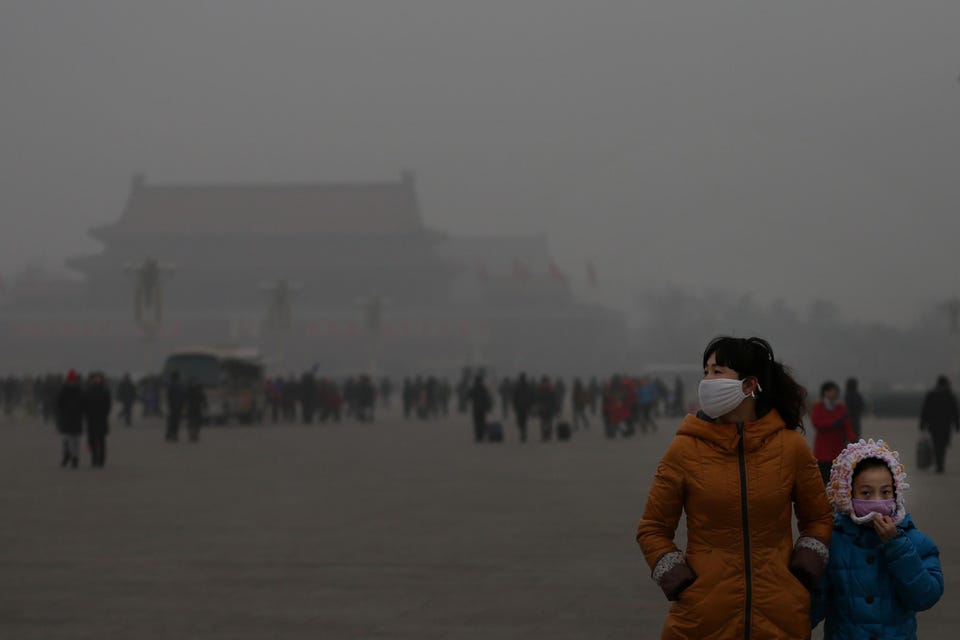Healthcare Air Purifiers At Home Could Protect Infants’ Brain Development From High Levels Of Air Pollution Anuradha Varanasi Contributor Opinions expressed by Forbes Contributors are their own. Anuradha writes about environmental health disparities & epidemiology New! Follow this author to improve your content experience. Got it! Jun 23, 2022, 05:06am EDT | Share to Facebook Share to Twitter Share to Linkedin BEIJING, CHINA – JANUARY 23: A tourist and her daughter wearing the masks visit the Tiananmen .
. . [+] Square at dangerous levels of air pollution on January 23, 2013 in Beijing, China.
The air quality in Beijing on Wednesday hit serious levels again, as smog blanketed the city. (Photo by Feng Li/Getty Images) Getty Images High levels of fine particulate matter (PM2. 5) in the air can have devastating impacts on the brain development of unborn children.
During pregnancy, those who are exposed to PM 2. 5 are at an elevated risk of experiencing shorter gestation and fetal growth restriction. This in turn impairs the normal development of the infant’s brain and might potentially result in life-long disabilities .
Unfortunately, more than 90% of the world’s population breathes air with high concentrations of PM2. 5, way above the World Health Organization’s guidelines . In a new study published in the journal Environmental Health Perspectives , researchers found that air purifiers that use high efficiency particulate air (HEPA) filters could help in mitigating the negative impacts of PM2.
5 on infants’ brain development. Researchers have observed in previous studies that HEPA filters reduce PM2. 5 concentrations by 29% to 82% when used indoors in rooms where individuals tend to spend the most amount of time.
Most of the particulate matter inside buildings and homes are from outdoor sources . The group of researchers based in Mongolia and Canada set out to investigate if reducing particle exposure during pregnancy might help in improving children’s neurodevelopment. They recruited 540 pregnant women living in Ulaanbaatar, Mongolia from January 2014 to May 2015.
As the capital city, Ulaanbaatar is home to half of the country’s entire population of around 3 million citizens. During winters, the daily average of PM2. 5 concentration levels soar to 687 micrograms per cubic meter , that is 27 times higher than the WHO’s limit.
More than 60% of the city’s residents live in traditional Mongolian houses that rely on coal-powered heating stoves. It is estimated that these neighborhoods account for at least 45% of the outdoor PM2. 5 concentrations in the city.
MORE FOR YOU CDC: Salmonella Outbreak Has Left 279 Ill, 26 Hospitalized In 29 States Canadians End Up In ICU After Attending ‘Covid Party’ White House Mandates Pfizer Vaccines for Millions of Citizens . . .
Before the FDA Clinical or Safety Reviews Have Been Made Public The researchers recruited non-smokers whose gestation age was 13 weeks to 18 weeks when the study began. The researchers then deployed either one or two HEPA air purifiers in the homes of 268 pregnant women. They instructed them to keep the air purifier in the living room.
For those with larger apartments, the researchers gave them two air purifiers. Whereas 272 pregnant women in the control group did not receive any HEPA air purifiers. Once the women in the intervention group had their babies, the researchers took back the HEPA air purifiers.
Four years later, the researchers assessed the cognitive development of the children in both groups based on their full-scale intelligence quotient (FSIQ). They observed that the children of mothers who received the HEPA air purifiers scored an average FSIQ that was 2. 8 points higher than the 4-year-old children in the control group.
The children whose mothers had access to HEPA air filters had far more superior verbal comprehension scores. In a press release, lead author of the study Ryan Allen, who is a professor at the Simon Fraser University in Canada said, “Air pollution is everywhere, and it is preventing children from reaching their full potential. Air cleaners may provide some protection, but ultimately the only way to protect all children is to reduce emissions.
” Follow me on Twitter . Anuradha Varanasi Editorial Standards Print Reprints & Permissions.
From: forbes
URL: https://www.forbes.com/sites/anuradhavaranasi/2022/06/23/air-purifiers-at-home-could-protect-infants-brain-development-from-high-levels-of-air-pollution/



